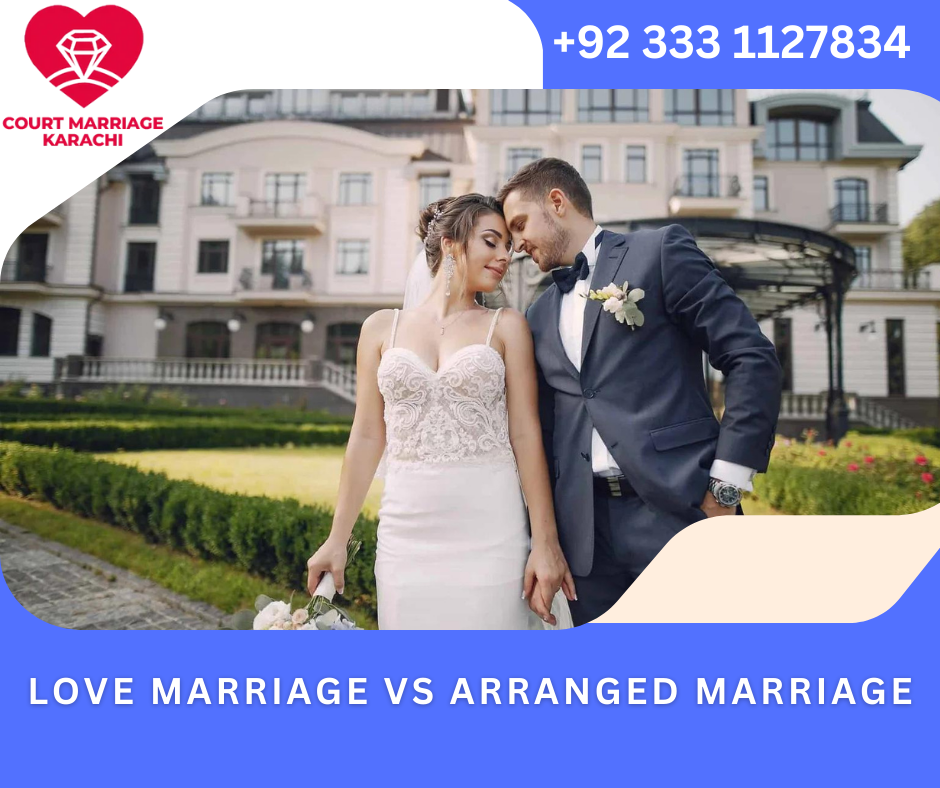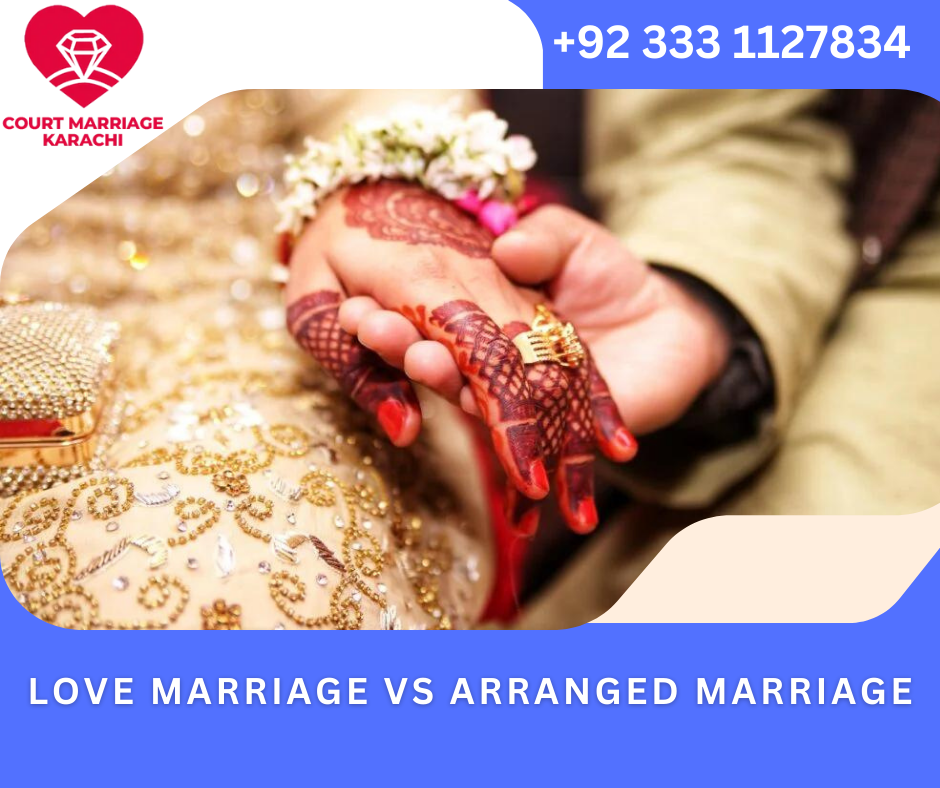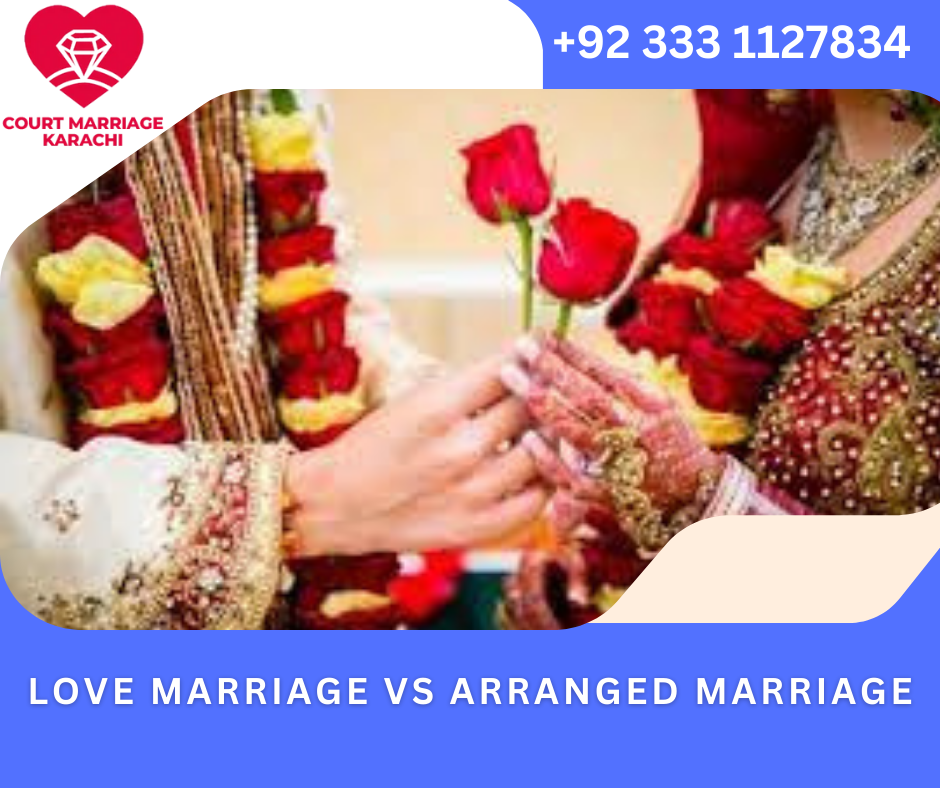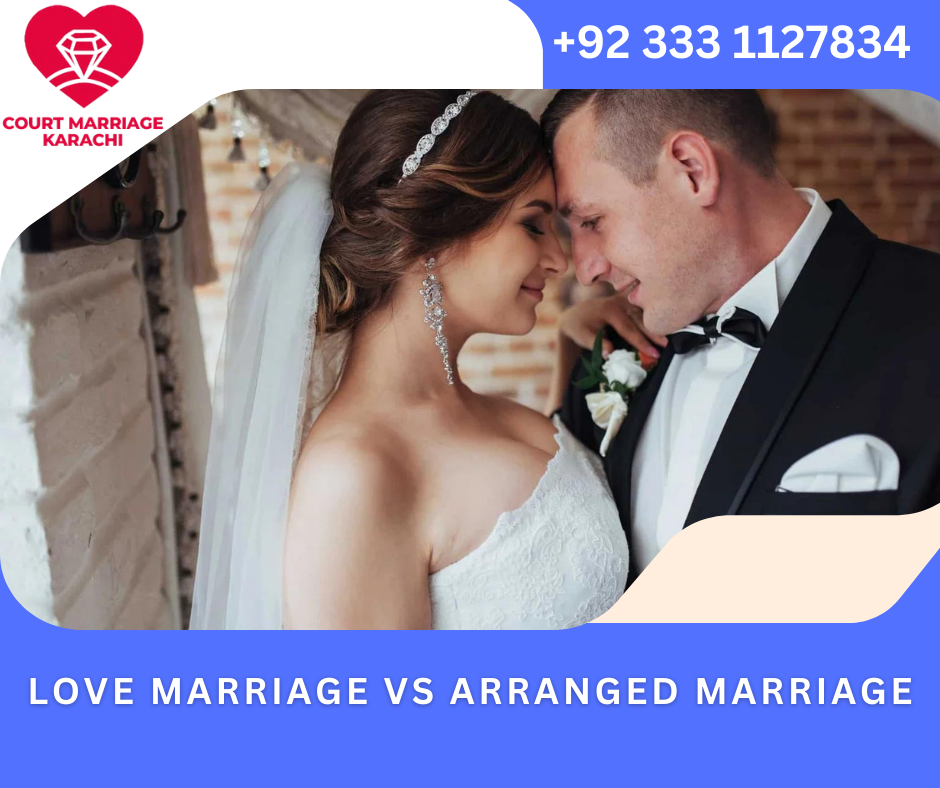Love Marriage VS Arranged Marriage
Blog By: Asif Raza
Love Marriage vs. Arranged Marriage: A Comparative Analysis
Love marriage and arranged marriage are two distinct approaches to marital union, each with its advantages, challenges, and cultural implications. Understanding the differences between these two forms of marriage can help individuals navigate their choices and make informed decisions about their marital future.
Definition of Love Marriage
Explanation of how love marriage is characterized by the couple’s independent choice and mutual affection, irrespective of parental consent or involvement.
Contrast with arranged marriage, where familial arrangements and considerations predominate in the selection of partners.
Historical Context
Discussion on the historical roots of love marriage and its prevalence during the Victorian era.
Examination of how the concept has evolved over time and its continued relevance in contemporary societies.
Global Usage of the Term
Overview of the widespread usage of the term “love marriage” in Commonwealth countries such as India, Pakistan, Bangladesh, and Sri Lanka.
Mention of other countries where the term remains prevalent, including Nepal and Egypt.
Characteristics of Love Marriage
Explanation of the key features of love marriages, including autonomy in partner selection, emphasis on personal feelings, and prioritization of romantic relationships.
Comparison with arranged marriages, highlighting the differences in decision-making processes and relationship dynamics.
Cultural Perspectives
Exploration of cultural attitudes and perceptions towards love marriage in different societies.
Analysis of how factors such as religion, tradition, and societal norms influence the acceptance and prevalence of love marriages.
Challenges and Considerations
Discuss the challenges couples face in love marriages, such as familial opposition, societal stigma, and cultural expectations.
Consideration of the impact of globalization and modernization on changing attitudes towards love marriage in diverse cultural contexts.
Conclusion:
Recapitulation of the defining characteristics and cultural significance of love marriage.
Reflection on the enduring relevance of love marriage in contemporary societies and its role in shaping romantic relationships and marital norms.
Arranged Marriage: Tradition, Practice, and Contemporary Perspectives
Introduction to Arranged Marriage
Arranged marriage is a traditional form of marital union wherein the bride and groom are primarily selected by individuals other than the couple themselves, typically by family members such as parents or relatives. In certain cultures, the assistance of a professional matchmaker may also be sought to facilitate the process of finding a suitable spouse for a young person.
Historical and Cultural Significance
Arranged marriages have played a prominent role in numerous cultures throughout history, serving as a cornerstone of familial and societal structures. This practice remains prevalent in various regions across the globe, including the Caucasus, Central Asia, North Africa, South Asia, Southeast Asia, sub-Saharan Africa, and West Asia. Despite its historical prevalence, arranged marriages have declined significantly in many parts of the world during the 19th and 20th centuries, reflecting shifting social dynamics and modernization.

Contemporary Practice and Challenges
While arranged marriages continue to persist in many societies, they are not without controversy and criticism. Forced marriages, a subset of arranged marriages practiced in some families, are widely condemned by international organizations such as the United Nations. Particularly concerning is the issue of forced child marriage, which is universally condemned due to its violation of basic human rights and child welfare. Despite these challenges, arranged marriages remain deeply ingrained in cultural and familial traditions for many individuals and communities.
Cultural Variations and Autonomy
It is important to recognize that the dynamics of arranged marriage vary significantly across different cultures and regions. While some cultures adhere strictly to traditional arranged marriage practices, others allow for varying degrees of autonomy and choice in partner selection. In some communities, individuals have the freedom to express their preferences and influence the matchmaking process, while in others, the decision is largely dictated by familial expectations and societal norms.
Knowing Arranged Marriages
Arranged marriage, with its rich historical legacy and cultural significance, continues to be practiced and debated in various parts of the world. While it remains a cherished tradition for many, the practice faces scrutiny and challenges, particularly concerning consent, autonomy, and human rights issues. Understanding the complexities and nuances of arranged marriage is essential for fostering informed discussions and promoting respect for diverse cultural practices and values.
Love Marriage:
Love marriage is characterized by the union of two individuals who have chosen each other based on mutual affection, attraction, and compatibility. The couple typically develops a romantic relationship in a love marriage before deciding to tie the knot. The marriage decision is primarily driven by the couple’s personal feelings and desires rather than external influences such as family or societal expectations. Love marriages often prioritize individual autonomy and emotional fulfillment, as couples are empowered to make choices regarding their life partner.


Pros of Love Marriage
- Emotional Compatibility: Love marriages often stem from a deep emotional connection between partners, fostering a strong foundation for the relationship.
- Personal Choice: Couples have the freedom to choose their life partner based on personal preferences and mutual affection.
- Greater Understanding: Since love marriages involve getting to know each other before marriage, couples may have a better understanding of each other’s personalities, values, and goals.
Cons of Love Marriage
- Familial Opposition: Love marriages may face resistance or disapproval from families who prefer traditional arranged marriages.
- Social Stigma: In some cultures, love marriages may be perceived as unconventional or rebellious, leading to societal scrutiny or judgment.
- Compatibility Challenges: Despite emotional connection, couples in love marriages may still encounter compatibility issues or conflicts post-marriage.
Arranged Marriage
Arranged marriage is a marital union facilitated by family members, relatives, or matchmakers, where the couple meets and agrees to marry based on the recommendations and arrangements made by their families. In an arranged marriage, considerations such as family background, social status, and compatibility are often prioritized over romantic feelings. The decision to marry is influenced by familial and societal factors, with the belief that compatibility can develop over time through mutual understanding and compromise.
Pros of Arranged Marriage
- Familial Support: Arranged marriages benefit from the involvement and support of family members, who may offer guidance and assistance throughout the process.
- Social Stability: Arranged marriages often promote social cohesion and familial harmony, as they reinforce familial ties and collective decision-making.
- Shared Values: Couples in arranged marriages may share similar cultural, religious, and social values, fostering a sense of unity and cohesion within the relationship.
Cons of Arranged Marriage
- Limited Autonomy: Individuals in arranged marriages may have limited control over the choice of their life partner, as the decision is often influenced by family expectations.
- Compatibility Concerns: Arranged marriages may face challenges related to compatibility and adjustment, as couples may have limited prior knowledge or understanding of each other.
- Emotional Connection: Initially, couples in arranged marriages may lack the emotional intimacy and connection commonly found in love marriages, requiring time to develop a deeper bond.
Ultimately, whether one chooses a love marriage or an arranged marriage depends on individual preferences, cultural norms, and personal circumstances. Both forms of marriage have their merits and challenges, and neither is inherently superior to the other. What matters most is the commitment, understanding, and effort invested by the couple in nurturing a fulfilling and harmonious marital relationship, regardless of how the marriage was initiated.
Honor Killings: Enforcing Arranged Marriages through Violence
Honor Killings
In specific communities, particularly in rural areas of the Middle East, North Africa, and South Asia, honor is deeply intertwined with family reputation and societal expectations. Women who deviate from prescribed norms, such as refusing arranged marriages or engaging in behavior considered “immoral,” risk bringing dishonor upon their entire families. In such cultures, honor killings, a form of violence perpetrated against women to maintain family honor, serve as a brutal enforcement mechanism for the institution of arranged marriages.
Cultural Context and Social Pressure
The pressure to conform to societal expectations surrounding marriage and morality is immense in these communities. Women who resist arranged marriages or seek divorce may face ostracization, ridicule, or even violence from their families and communities. The perceived dishonor brought upon the family by a woman’s actions can have far-reaching consequences, affecting the marriage prospects of her siblings and tarnishing the family’s reputation in the community.
Enforcement through Violence
Honor killings represent the extreme end of the spectrum in enforcing the institution of arranged marriages. When a woman is perceived to have dishonored her family, her male relatives may resort to violence as a means of restoring their family’s honor. Unlike cases of domestic violence, honor killings are often carried out publicly, serving as a gruesome spectacle intended to deter others from similar acts of defiance. In many instances, multiple family members may be complicit in the act, further reinforcing the collective nature of these crimes.
Impact and Consequences
The prevalence of honor killings perpetuates a culture of fear and oppression, particularly for women who dare to challenge the constraints imposed by arranged marriages and societal expectations. The normalization of violence against women in the name of honor perpetuates cycles of abuse and perpetuates gender inequality within these communities. Moreover, the impunity often enjoyed by perpetrators of honor killings further exacerbates the systemic injustices faced by women in these societies.


Challenges and Solutions
Addressing the root causes of honor killings requires a multifaceted approach that addresses cultural norms, legal frameworks, and social attitudes toward gender and marriage. Efforts to combat honor killings must involve raising awareness, advocating for legal reforms to protect women’s rights, and providing support services for victims and survivors. Additionally, challenging patriarchal attitudes and promoting gender equality are essential steps toward eradicating the entrenched practices of honor-based violence and ensuring justice for victims.
Transform Your Love Marriage into an Arranged Marriage with CourtMarriageLaw.com
Are you considering transitioning your love marriage into an arranged marriage? At CourtMarriageLaw.com, we understand that cultural or familial expectations may lead couples to seek a more traditional marital arrangement. Our experienced team specializes in facilitating the conversion of love marriages into arranged marriages, ensuring a smooth and respectful transition for all parties involved.
With our expertise in both love and arranged marriage processes, we offer personalized guidance and support to help you navigate this significant transition. Whether you’re seeking assistance with familial introductions, matchmaking, or cultural sensitivities, our team is here to provide comprehensive assistance at every step.
Why Choose CourtMarriageLaw.com?
- Expertise: Our team has extensive experience in navigating love and arranged marriage procedures, allowing us to offer tailored solutions to meet your needs.
- Cultural Sensitivity: We understand the importance of cultural traditions and familial expectations and approach each case with sensitivity and respect for your unique cultural background.
- Confidentiality: Your privacy and confidentiality are our top priorities. We handle all matters with the utmost discretion and professionalism.
- Supportive Guidance: From initial consultation to completing the transition process, we provide compassionate and supportive guidance to ensure your peace of mind throughout the journey.
Contact Us Today
Ready to explore the possibility of transitioning your love marriage into an arranged marriage? Contact CourtMarriageLaw.com today to schedule a consultation with our experienced team. Let us help you navigate this important decision with care and expertise, ensuring a smooth and successful transition for you and your partner.”
